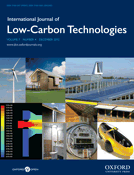
International Journal of Low-Carbon Technologies
Scope & Guideline
Empowering the quest for sustainable practices.
Introduction
Aims and Scopes
- Energy Efficiency in Buildings:
Research on optimizing energy consumption in residential and commercial buildings, including thermal comfort, energy retrofitting, and innovative building materials. - Renewable Energy Systems:
Investigation into the integration and optimization of renewable energy sources such as solar, wind, and hybrid systems, emphasizing their role in low-carbon technology. - Carbon Emission Reduction Strategies:
Studies focusing on methodologies for measuring, assessing, and reducing carbon emissions in various sectors including transportation, manufacturing, and urban development. - Smart Grid Technologies:
Exploration of smart grid solutions, including energy management systems, load forecasting, and the integration of IoT for enhanced energy efficiency. - Sustainable Urban Development:
Research on urban planning and development strategies that promote sustainability, low-carbon practices, and resilience against climate change. - Climate Change Mitigation:
Analysis of technologies and policies aimed at mitigating climate change impacts, including carbon capture and utilization, and lifecycle assessments. - Innovative Materials and Technologies:
Development and application of novel materials and technologies that contribute to energy savings and reduced environmental impact.
Trending and Emerging
- Artificial Intelligence in Energy Management:
The application of AI and machine learning techniques for optimizing energy management in various systems, including buildings and smart grids, is gaining significant traction. - Life Cycle Assessment and Circular Economy:
An increasing number of studies emphasize life cycle assessments and circular economy principles, focusing on sustainable resource use and waste reduction in low-carbon technologies. - Decentralized Energy Systems:
Research on decentralized energy systems, including microgrids and community energy solutions, is on the rise, highlighting the shift towards localized energy production and consumption. - Hydrogen Production and Utilization:
Innovations in hydrogen production and its applications in energy systems are emerging as critical areas of research, particularly in relation to renewable energy integration. - Smart Urban Mobility Solutions:
Emerging themes around sustainable urban transportation solutions, including electric vehicles and smart mobility frameworks, are increasingly prominent in recent publications. - Carbon Neutrality Frameworks:
There is a growing focus on frameworks and strategies for achieving carbon neutrality across various sectors, reflecting global commitments to climate action.
Declining or Waning
- Traditional Fossil Fuel Technologies:
Research related to traditional fossil fuel technologies has seen a decline as the focus shifts towards renewable energy solutions and low-carbon alternatives. - Basic Energy Consumption Studies:
Studies that merely quantify energy consumption without integrating innovative solutions or technologies are becoming less frequent, as the journal prioritizes actionable insights and advancements. - General Environmental Impact Assessments:
Broad environmental impact assessments without specific low-carbon technology applications are waning, reflecting a move towards more targeted and technology-driven studies. - Conventional Heating and Cooling Systems:
Research focusing on conventional heating and cooling systems is decreasing, as there is a growing emphasis on innovative, energy-efficient alternatives.
Similar Journals
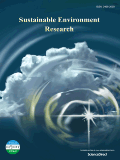
Sustainable Environment Research
Elevating research to combat global environmental challenges.Sustainable Environment Research, an esteemed journal published by BMC, serves as a pivotal platform for disseminating innovative research in the fields of Environmental Engineering, Pollution, and Renewable Energy. Established in 2016 as an Open Access journal, it facilitates the widespread sharing of knowledge and advancements across the globe, reflecting its commitment to enhancing environmental sustainability. With an impressive Q1 ranking in multiple categories, including Water Science and Technology and Pollution, the journal is recognized for its significant impact, currently holding a rank of 31st in Environmental Science - Water Science and Technology. The journal actively invites researchers, professionals, and students to contribute to crucial discussions around sustainable practices and technologies, thus addressing worldwide environmental challenges. Based in Taiwan but accessible internationally, Sustainable Environment Research provides a valuable resource for those dedicated to advancing the science of sustainability.
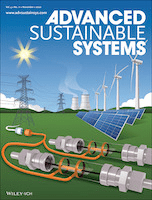
Advanced Sustainable Systems
Advancing Knowledge for a Resilient EarthAdvanced Sustainable Systems is a premier academic journal published by WILEY-V C H VERLAG GMBH, dedicated to the dynamic fields of environmental science and renewable energy. With an ISSN of 2366-7486, this journal has rapidly established its significance within the scientific community, achieving a prestigious Q1 ranking in both Environmental Science (miscellaneous) and Renewable Energy, Sustainability and the Environment categories as of 2023. Spanning the converged years from 2017 to 2024, it serves as a vital platform for researchers and practitioners alike, facilitating the dissemination of innovative ideas and groundbreaking research that drive sustainability initiatives globally. Although not an Open Access publication, its contributions are invaluable, reflected by its commendable Scopus rankings—#28 out of 233 in General Environmental Science and #49 out of 270 in Renewable Energy. As we face pressing environmental challenges, Advanced Sustainable Systems remains at the forefront, championing research that informs and influences sustainable practices and policies across the globe.
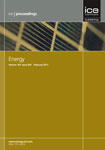
Proceedings of the Institution of Civil Engineers-Energy
Illuminating the path to renewable energy advancements.Proceedings of the Institution of Civil Engineers-Energy is a pivotal journal published by Emerald Group Publishing Ltd, focusing on the dynamic fields of energy engineering and power technology. With an ISSN of 1751-4223 and an E-ISSN of 1751-4231, this journal stands at the forefront of advancing research from 2008 to 2024, encapsulating critical insights into energy systems, sustainability, and innovative practices within the energy sector. The journal holds a commendable position in Scopus rankings, especially in the categories of Energy Engineering and Power Technology, with a Q3 quartile ranking reflecting its growing influence and relevance. Though currently not Open Access, it provides valuable content for researchers and professionals seeking to explore emerging trends and challenges in energy management and renewable resources. Aimed at bridging the gap between theoretical frameworks and practical applications, this journal is essential for anyone invested in the transformation of the energy landscape.
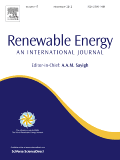
Renewable Energy
Advancing Sustainability Through Cutting-Edge Research.Renewable Energy is a prestigious international journal published by PERGAMON-ELSEVIER SCIENCE LTD, dedicated to advancing the field of renewable energy technologies and their applications. Since its inception in 1991, this journal has provided a critical platform for researchers, professionals, and students to explore innovative solutions in renewable energy, sustainability, and environmental protection. With an impressive impact factor and ranked in the top quartile (Q1) of its category, Renewable Energy is recognized for its high-quality, peer-reviewed research that significantly contributes to the scientific and professional discourse in the sector. The journal is indexed in Scopus, holding an esteemed rank of #21 out of 270 in its field, underscoring its influence and reach. Researchers can access the journal’s articles through traditional subscriptions, ensuring a broad dissemination of vital knowledge that supports the global transition to sustainable energy sources. Addressed from its headquarters in Oxford, England, Renewable Energy is crucial for anyone involved in the journey towards a sustainable future, fostering collaboration and innovation in a critical area of environmental science.
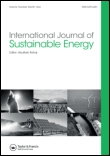
International Journal of Sustainable Energy
Exploring Pathways to a Greener PlanetInternational Journal of Sustainable Energy is a premier peer-reviewed journal published by TAYLOR & FRANCIS LTD that serves as a vital platform for the dissemination of innovative research in the field of sustainable energy. With an ISSN of 1478-6451 and an E-ISSN of 1478-646X, this journal has established a significant reputation, currently ranked in the Q2 category across multiple disciplines such as Energy (miscellaneous), Fluid Flow and Transfer Processes, and Fuel Technology, reflecting its commitment to high-quality academic contributions. The journal has been Open Access since 2022, ensuring that research is freely accessible to a global audience, fostering collaboration and knowledge sharing. Positioned in the United Kingdom, the journal strives to address the critical challenges surrounding renewable energy and sustainability, appealing to researchers, professionals, and students alike. The Scopus rankings further enhance its credibility, showcasing its impact in the field with notable percentiles across various energy-related categories. With converged years from 2003 to 2024, the International Journal of Sustainable Energy remains a cornerstone for innovative research that seeks to pave the way towards a more sustainable future.
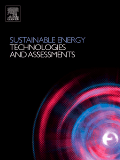
Sustainable Energy Technologies and Assessments
Illuminating Paths to Renewable Energy ExcellenceSustainable Energy Technologies and Assessments is a prestigious journal published by ELSEVIER, based in the United Kingdom, focusing on the critical field of energy engineering and its intersection with sustainability. Since its inception in 2013, the journal has established itself as a leading platform for disseminating innovative research and assessments of sustainable energy technologies, earning a notable Q1 ranking in both Energy Engineering and Power Technology, as well as Renewable Energy, Sustainability, and the Environment. With an impressive Scopus ranking—#22 out of 272 in Energy Engineering and #40 out of 270 in Renewable Energy—this journal is essential for researchers and professionals seeking to advance their knowledge on cutting-edge developments and assessments in sustainable energy. Although the journal operates on a subscription basis, it remains committed to promoting high-quality research that aligns with global sustainability objectives. Researchers and students alike will find invaluable insights and data that shape the future of renewable energy technologies within these pages.

Sustainable and Resilient Infrastructure
Fostering Innovation for a Resilient TomorrowSustainable and Resilient Infrastructure, published by TAYLOR & FRANCIS LTD, is a premier journal dedicated to the advancement of knowledge in the fields of building and construction, civil and structural engineering, and geography, planning, and development. Since its inception in 2016, this journal has established itself with an impressive Q1 ranking in multiple categories, reflecting its commitment to high-quality research and innovative practices. It occupies a distinguished position in Scopus with robust rankings across various engineering and social sciences fields, making it an essential publication for researchers and professionals aiming to address contemporary challenges in infrastructure sustainability and resilience. Although it is not an open access journal, it provides a platform for critical discussions on safety, risk, reliability, and quality in engineering, further enhancing its relevance in the academic community. As it converges on its 2024 goals, Sustainable and Resilient Infrastructure continues to be a pivotal resource for those engaged in building a sustainable future.

Global Energy Interconnection-China
Fostering Collaborative Insights in Renewable EnergyGlobal Energy Interconnection-China is an esteemed Open Access journal published by KEAI PUBLISHING LTD that focuses on the rapidly evolving fields of energy engineering and power technology. Since its launch in 2018, the journal has become a vital resource for researchers and professionals interested in sustainable energy solutions and innovative technologies, addressing the critical challenges facing the global energy landscape. With an impressive Q2 categorization in multiple engineering and energy-related disciplines, the journal ranks highly in Scopus, positioning itself as a leading platform for disseminating impactful research. Specifically, it excels in Automotive Engineering and Control and Systems Engineering, as evidenced by its competitive standing within the top quantiles of its fields. By leveraging its open access model, Global Energy Interconnection-China ensures that high-quality research is accessible to a worldwide audience, fostering collaboration and advancements in renewable energy, sustainability, and environmental conservation. For researchers, professionals, and students alike, this journal serves as a pivotal forum for sharing insights and innovations that shape the future of energy interconnection.

Clean Technologies
Connecting Minds for a Sustainable WorldClean Technologies, published by MDPI in Switzerland, is a pioneering open-access journal that has garnered significant recognition since its inception. Focusing on innovative solutions and practices for sustainability, it aims to serve the interdisciplinary field of clean technology while addressing pressing environmental challenges. With an impressive impact factor evidenced by its Q2 ranking in Environmental Science (miscellaneous) and Q3 in Global and Planetary Change, as well as a Scopus rank of #43 among a competitive pool of journals in these fields, Clean Technologies is positioned as a vital resource for researchers, professionals, and students alike. As a forward-thinking platform with open access since 2018, the journal emphasizes the dissemination of high-quality research, fostering collaboration and innovation in the quest for sustainable development. Located at ST ALBAN-ANLAGE 66, CH-4052 BASEL, SWITZERLAND, it also provides a comprehensive digital archive that allows for easy access to cutting-edge studies and findings relevant to global sustainability efforts.
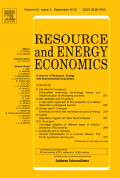
RESOURCE AND ENERGY ECONOMICS
Shaping the Future of Resource and Energy EconomicsRESOURCE AND ENERGY ECONOMICS is a premier academic journal published by ELSEVIER, specializing in the intricate fields of economics and econometrics with a particular focus on the intersection of resource management and energy policy. Established in 1993, the journal has been a vital platform for scholars and professionals, contributing to significant advancements in the understanding of economic aspects surrounding natural resources and energy systems. With an impressive impact factor and ranking in the top quartile (Q1) of its category, it is recognized for its rigorous peer-reviewed research that informs both academic inquiry and practical applications in the industry. The journal is based in the Netherlands and caters to a global audience, fostering interdisciplinary discussions aimed at addressing pressing environmental and economic challenges. Accessible primarily through institutional subscriptions, RESOURCE AND ENERGY ECONOMICS continues to shape the discourse in its field, making it an essential read for researchers, policymakers, and practitioners striving for innovative solutions in resource and energy economics.